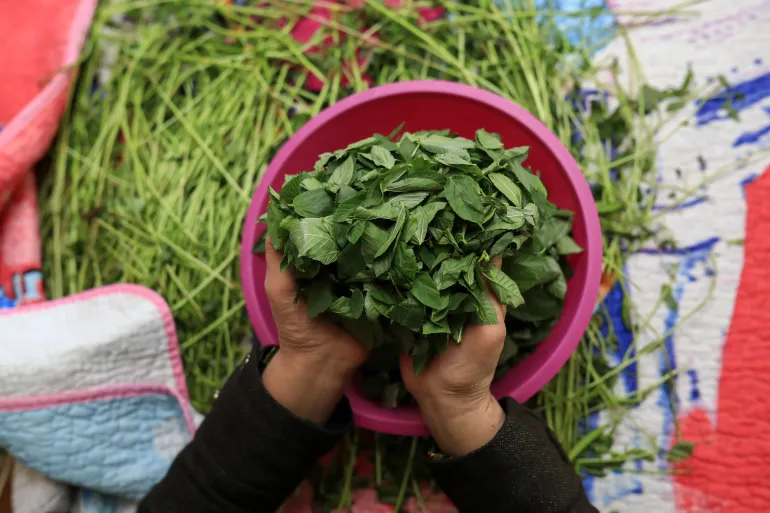Every year, Palestinian moms and grandmothers wonder if Molokhia may prevent Israeli attacks because they believe it promotes optimism.
Gaza City-
The first day of the holy month of Ramadan doesn’t require Siham Abu Shaaban, 40, to plan her iftar meal.
The obvious choice is molokhia, a hearty stew made with jute mallow plant leaves that are traditionally served as the “opener” Ramadan meal in Gaza.
Like many other families in Gaza, the Abu Shaaban family treasures this tradition. According to Siham, moms and grandmothers believe that the color green of molokhia promotes hope and would bring good fortune throughout the holy month.
Even after Israel repeatedly attacked them during recent Ramadans, Palestinians in Gaza continue to wish for a better, greener year every year. There have been so many that making Molokhia can be simultaneously cynical and optimistic as Palestinians wonder if it will prevent attacks this time.
“My husband, my children, and I like molokhia. It is produced from the jute mallow plant. As she removes the leaves from the molokhia stalks, Siham tells Al Jazeera that she used to hear her grandmother say that molokhia is one of the foods that “brings blessings.”
The mother of four prepares molokhia throughout the month for her mother, father, two sisters, and her four children in addition to her husband and two children.
Family get-togethers are customary during Ramadan, so when she invites her relatives over and suggests a menu, her father insisted that molokhia be served with the main course.
When molokhia is present, such as on the first day of Ramadan or any other day, Siham’s husband visits the market to get new jute mallow. After selecting and washing the leaves with Siham, her mother slices them by hand until they are a soft paste with just the right amount of leafy flecks visible. She then cooks the molokhia with chicken or pork and garlic.
Siham states, “I grind molokhia by hand using a makhana,” referring to a two-handed knife with a curved blade that is comparable to the mezzaluna in Italy.
However, Siham claims she still likes to ground the leaves by hand because “manual grinding has a special taste” even though many people now use a food processor to do so.
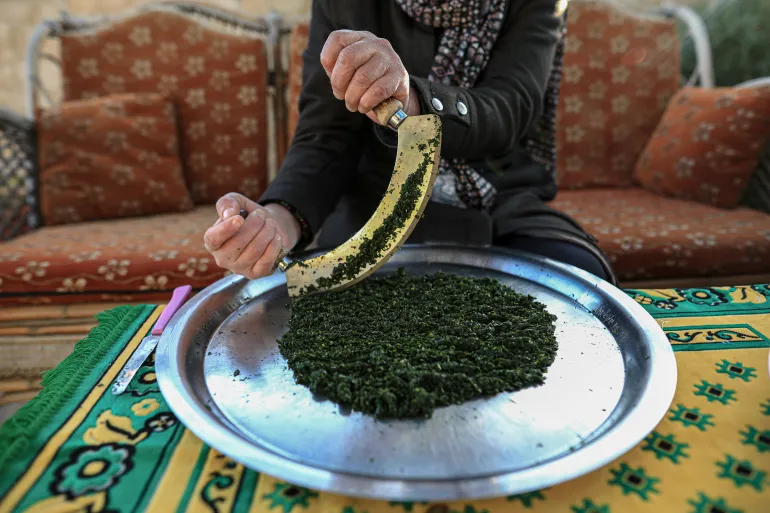
Siham uses a makhana, a double-handled knife with a curved blade that is comparable to the Italian mezzaluna, to grind the leaves. [Al Jazeera’s Abdulhakim Abu Riash]
Every family in Gaza prepares molokhia differently. The majority choose a version that is finely chopped and thick soup, but some simmer the leaves whole and add meat and nuts for a dish called molokhia borani.
Molokhia is served alongside other Ramadan specialties like macroura (meat, vegetables, and rice cooked in layers, then flipped to serve), musakhan (chicken roasted with sumac and nuts, all served on layers of olive oil-soaked taboon bread), and Gazan fatta (toasted saj bread soaked in meat or chicken broth, topped with white rice and chunks of meat or chicken).
Siham enjoys serving her molokhia with veggies, rice, freshly baked bread, and grilled chicken.
The majority of Gazans, including her family and herself, prefer to consume molokhia by dipping it into freshly made bread, according to the woman.
Siham enjoys serving her molokhia with veggies, rice, freshly baked bread, and grilled chicken.
The majority of Gazans, including her family and herself, prefer to consume molokhia by dipping it into freshly made bread, according to the woman.
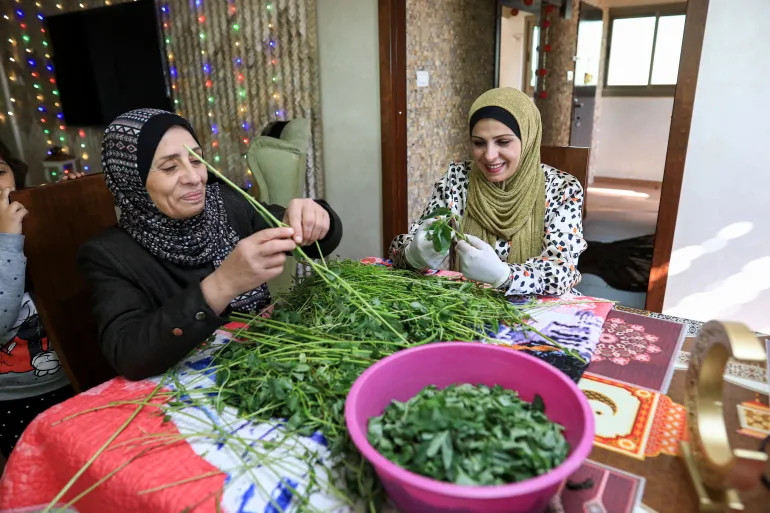
Siham and her mother collect the leaves and clean them for a few hours [Abdelhakim Abu Riash/Al Jazeera]
Other delights from Gaza are being brought to the table by Siham, including soup, “Ghazzawi salad,” hummus, and falafel packed with onions and sumac.
Siham adds, “Ghazzawi salad is another queen on the table, beside the molokhia,” as she prepares the ingredients. It is only served with molokhia and consists of crushed tomatoes, spicy green peppers, salt, and lemon.
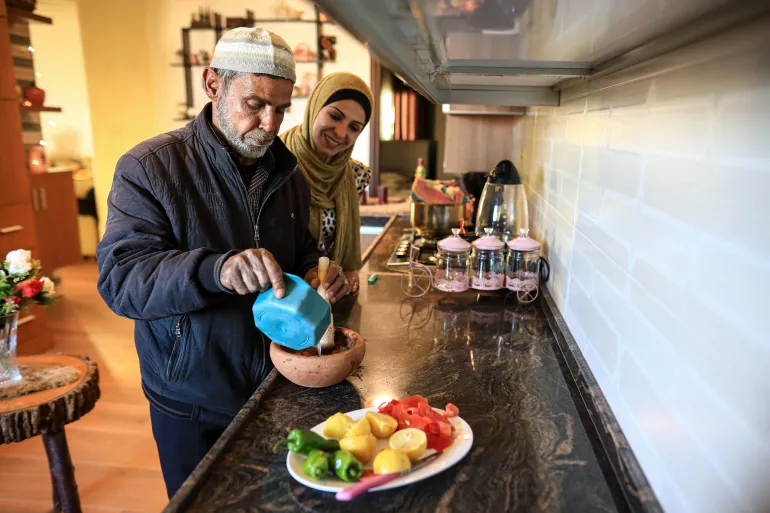
The “Gazzawi salad” is made by Siham’s father [Abdelhakim Abu Riash/Al Jazeera].
Jamal Abu Shaaban, Siham’s father, is waking up from a nap and preparing the salad in a ceramic bowl the way he likes it.
If salad isn’t made in a pottery bowl, it won’t taste well. As he crushes tomatoes in a mortar and pestle, Jamal asserts that this practice is truly Ghazzawi.
The father makes the salad in Siham’s family as he does in almost every other home in Gaza. Green pepper, dill seeds, lemon, and a lot of Palestinian olive oil are all used by Jamal in his.
To beautiful mission from passion
When Siham created Molokhia for the first time when she was 14 years old, she developed a passion for cooking.
She describes her first time creating molokhia as being “absolutely perfect”.
I have a special place in my heart for Molokhia. She says as she ladles rice into a pot, “It is the first dish I tried to cook and succeeded from the first attempt.
Then I continued to prepare all of the traditional Palestinian foods, as well as other Asian and Western dishes, as well as desserts.
She joined a local culinary society for chefs and cooks in Gaza last year after being inspired by her passion to take cooking classes.
The group began preparing meals for underprivileged families in the Gaza Strip during Ramadan, collaborating to prepare, package, and deliver food.
“I’m overjoyed to be a part of this wonderful project. Families in Gaza have a very high proportion of poverty, and we want social solidarity, particularly during Ramadan, says Siham.
She continues, looking at her watch to see that the time for Maghrib prayers and iftar is only 30 minutes away, “I divide my time between volunteering at the cooking project and staying at home and preparing iftar for my family.
The molokhia’s enchanted moments
Family is a gift, according to Siham.
Siham and her family, which includes her mother, father, sister, and husband, work frantically to prepare iftar, scurrying around and next to one another like bees in a hive as they add finishing touches and transport dishes to the table that has been set up on their roof terrace. everyone but one.
In its life cycle, Molokhia has two crucial, almost miraculous phases. First, the proper quantity of bubbling stock is added along with the ground leaves, and the mixture is carefully swirled to prevent the leaves from sinking to the bottom of the pot. The molokhia won’t work if the leaves are prepared incorrectly, there is too much or too little stock, or the stars are not lined up.
The “tasks” moment, which according to Siham has arrived, is the second pivotal moment and admittedly a more dramatic one. The “tshshshshsh” sound generated when boiling, ghee-fried garlic and crushed coriander are dropped into simmering molokhia gives the tasks its name, while the aroma in the kitchen shifts from earthy to mouthwateringly delicious.
“Tasha transports the flavor of molokhia to a different setting. The sounds and scents of fried garlic fill the air as the enthusiastic cook declares, “It is impossible to enjoy molokhia without it.
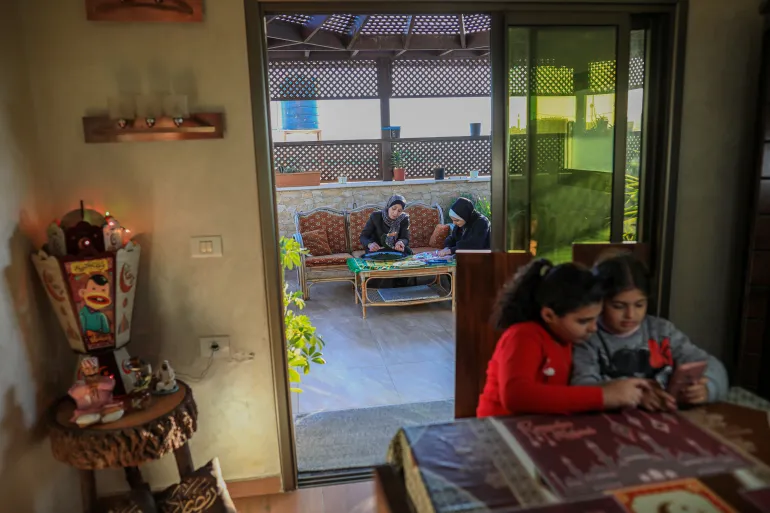
Before the iftar, the Shabaan family [Abdelhakim Abu Riash/Al Jazeera]
Siham pours molokhia into bowls right before iftar so it stays hot as the sun is about to drop and the iftar table is almost ready, waiting for the star to appear.
The call to prayer signals the beginning of iftar and the end of a day of fasting as everyone gathers around the table. Siham’s mother puts out bowls of soup and gives out bread while the family breaks their fast with a drink of water.
Siham was putting the finishing touches on two freshly baked roasted chickens when she arrived at the table, as is customary for moms.
After a few tastes of the perfectly delicate chicken and spoonfuls of the fragrant, delicious, and oh-so-green molokhia, everyone is praising Siham’s cooking and wished her “sufra aamra layman” (a plentiful table for always).
After the dinner is finished and the prayers are completed, everyone helps to clean up once again, and then Siham’s father signals for her to start the coffee.
After iftar, coffee is sacred, he chuckles.
Siham makes the coffee, pours it into a dallah, a traditional Arabic coffee pot, and serves it with a variety of her homemade chocolate-covered dates and nuts.
“I adore these gatherings and family times. A family is a gift. She continues, sipping her coffee, “I always pray that Ramadan goes smoothly and without any disruptions.
